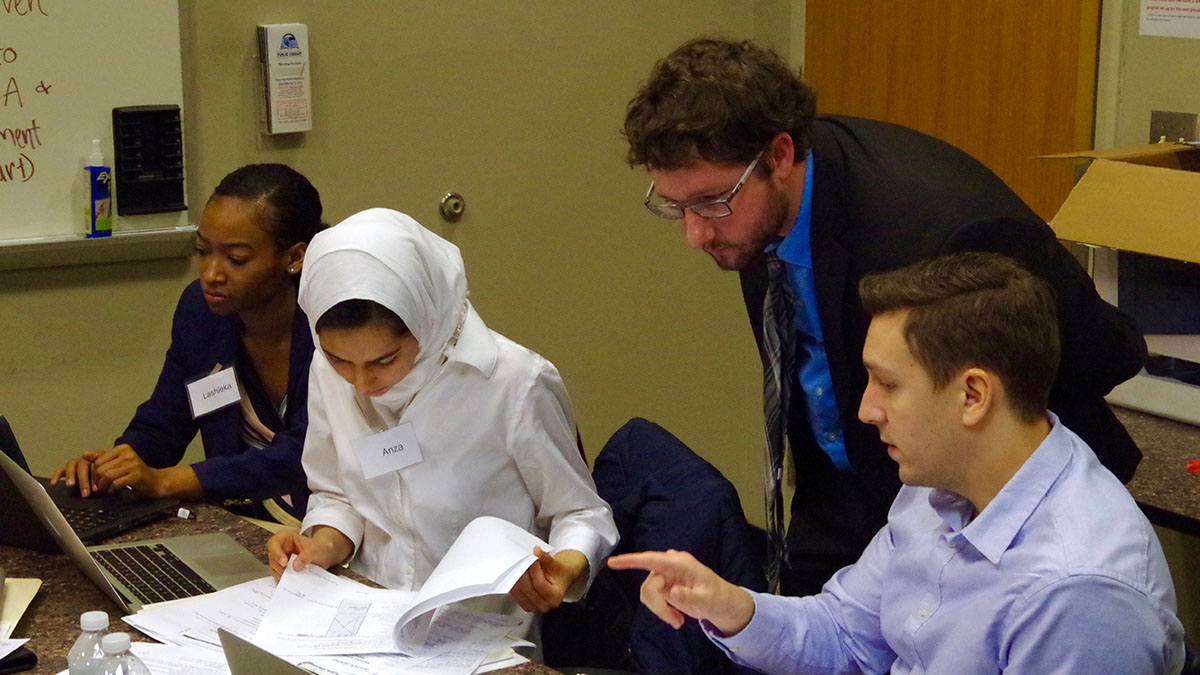Carolina Law students give back
The UNC School of Law’s Pro Bono Program allows law students to serve unmet legal needs in their communities while providing students with hands-on experience in the field.

Not many law students can say they’ve contributed to a federal court case. But Rachel E. Grossman, a first-year student at the UNC School of Law, has already checked that accomplishment off her list.
Through Carolina Law’s Pro Bono Program, which allows law students to work alongside supervising attorneys in the field, Grossman played a crucial role in preparing an amicus brief for a U.S. court of appeals. That brief, which included research supporting a ruling to provide medical care to incarcerated transgender women, was successfully filed this January.
“I came into law school because I wanted to do social justice work, and I think it’s important not to forget about what that looks like in practice,” Grossman said. “Pro bono work has been a good way to stay centered on the communities I care about and the reasons I’m here — the reasons why I want to be an attorney and practice law.”
The Pro Bono Program allows Carolina Law students to get hands-on experience by working on cases that range from helping cancer patients complete complex legal forms to securing humanitarian aid for refugee children to assisting clients with wills and advanced directives.
While the program is designed to provide free student support to under-resourced legal organizations in North Carolina, program director Allison Standard said pro bono work is just as rewarding for students as it is for the communities they serve.
“We’re hoping to meet unmet legal needs in the community, and at the same time we are hoping for students to get experience developing legal skills, which will help them make decisions about where they might like to be in the legal profession,” she said. “It’s a two-fold mission in a wonderful way.”
Whether they’re interacting with clients firsthand, preparing legal documents or helping with case research, Carolina law students benefit from the supervision and guidance of seasoned attorneys.
“One of the special things about the program is that it doesn’t matter what you’re planning to do after law school,” Standard said. “Students who are planning to work in public interest legal careers are doing pro bono, but students who plan to do corporate law at large law firms in big cities are doing it too.”
Over winter break, 145 students volunteered to take on pro bono projects during their time off.
“It always surprises me how many students are willing to give their time and volunteer for these projects,” Standard said. “It makes me proud. And it’s so valuable because being able to put things you’ve learned in the classroom to use really makes students think about how the law affects real people.”
Grossman, who enrolled at Carolina Law to give back to the state where she grew up, agrees.
“When you start to build connections with community members who are in need of pro bono work, I think it gets us into the mindset of thinking about the law as an agent for change and not just as a preserver of the status quo and creator of paychecks,” Grossman said.
As the program enters its 21st year at Carolina Law, Standard said the underlying goal remains the same: inspiring students to develop a commitment to service in the legal profession.
“Students start to see and understand the power that they have as law students,” she said, “and the even greater power they will have as lawyers to make a difference.”




